|

Spring 1995 (3.1)
Pages 10-12
Rasim
Babayev
(1927-2007)
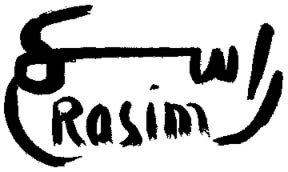
More paintings by Babayev - Dissident
See more works
at AZgallery.org
See cover Journeys
(Summer 1998) and Folklore
(Autumn 1996). More art samples by Rasim are available at
AZgallery.org
"The Wanderer"
Independence really
hasn't affected me so much from a creative point of view. I work
as I worked before. For me, art has always meant struggle. But
artists should anticipate
the daily struggle before they embark on this career. Matisse
used to say that painting for him was like a big, comfortable
easy chair. Well, for me, painting is life and life is always
struggle. I've always struggled against the system. Frankly,
that's why I never earned an art degree. I couldn't study under
the restrictions.
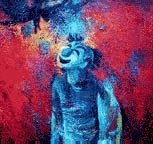  My troubles with
the State began in 1949 when I went to Moscow to study art. I
was rather naive back then. There were so many things I didn't
understand. I used to go to the Fine Arts Museums there. My troubles with
the State began in 1949 when I went to Moscow to study art. I
was rather naive back then. There were so many things I didn't
understand. I used to go to the Fine Arts Museums there.
One day I walked into the Pushkin Museum only to find that all
the exhibitions had been replaced with a display of presents
that had been given to Stalin. For the first time in my life,
I felt such an incredible resistance swell up within me against
the State and from that day onward my troubles began.
You see, to succeed during the Soviet period as an artist, you
had to depend upon jobs commissioned by the State. I hardly ever
did State Orders. I was never recognized by the Government since
I didn't paint portraits of our famous party leaders or undertake
projects like that. If you ask me how I used to live, I'd have
to admit that I was able to sell some of my paintings but mostly
I'm deeply indebted to friends.
It wasn't unusual for me to be denied the opportunity to show
my paintings. For example, in Moscow in 1977, I participated
in an exhibition but they rejected seven of my works, insisting
my ideas would provoke and agitate the people.
There was great pressure back
then to paint in a classical style and reflect social realism-not
abstract concepts. However, the Soviets did recognize a School
of Art known as "Primitivism". And much of my work
is created in that style-brilliant, saturated colors, absence
of perspective and lots of non-human characters.
Simply put, in my case that meant lots of monsters fill my canvases
(we call them "divs" or devils). Our folktales and
legends-stories so familiar from childhood-are full of these
scary creatures. But the truth is, I painted these monsters as
symbols of the previous regime and the oppression under which
we lived. The allegories were not understood back then. But these
images came from life around me. They weren't fantasy. They existed
in real life but I got away with painting them under the guise
of "Primitivism".
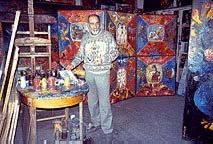  Left:
Rasim Babayev in his studio in Baku surrounded by earlier works,
which are characterized by Primitivism. December 1994. Left:
Rasim Babayev in his studio in Baku surrounded by earlier works,
which are characterized by Primitivism. December 1994.
These monsters are gradually
disappearing from my works now. It seems my images are much more
concrete these days. A lot of the content of my works seems to
precede the historic experiences in which we are living.
Paintings that Tell
Future
For example, in the
"Year of the Dragon" in the 1970s, I painted "White
Dragon". This mural extends over three-panels (each 3m x
2m) on a folding screen. It shows a white, pale, dragon reduced
to a skeleton. In our culture, the dragon always symbolizes power
and strength but this dragon is dying. Like so many of my works,
it represents the collapse of the Soviet Union.
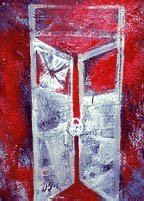  Left: "Locked Doors" Oil on Canvas,
80 x 100, 1970s. "We always faced locked doors wheneer we
approached government officials" by Rasim Left: "Locked Doors" Oil on Canvas,
80 x 100, 1970s. "We always faced locked doors wheneer we
approached government officials" by Rasim
In 1982 when my son
was in the military, I painted "Bloody General" (Oil,
canvas, 180 cm x 200 cm). My impressions and intuitions turned
out to be the reality of the 90s as we witness devastating wars
here in Azerbaijan and in other areas in the former Soviet Union.
"White Dragon" (Folding screen, (3m x 2m each). "All
my works represent the collapse of the Soviet Union."
Contemporary Period
My latest painting is
"Blue Horse" (1994). This animal is such a positive
symbol for us-power, beauty, and strength. We have an expression
in both Azerbaijani and Russian about "blue wish"-it's
something that we yearn after. But today our blue wish is in
trouble. I painted this horse flipped over on its back, struggling
to right itself. This is a horse but this is me, too. We're in
a period of turmoil. Life is very insecure and we're not sure
what direction it will take or what will happen to our new nation.
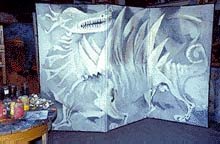  From an economic
point of view, I have more opportunities to exhibit my works
these days and foreigners are beginning to take an interest.
I'm somewhat known in Moscow and Europe-a French Gallery has
a few of my works. From an economic
point of view, I have more opportunities to exhibit my works
these days and foreigners are beginning to take an interest.
I'm somewhat known in Moscow and Europe-a French Gallery has
a few of my works.
My paintings are my children. It's hard for me to choose a single
favorite above the others. I wouldn't sell them at all except
that I have to.
But I'm optimistic. I was born an optimistic, so I'm very hopeful
about Azerbaijan's future. First of all, we've gained independence.
Well, we didn't really "win" it ourselves; it was somehow
given to us whether we were ready for it or not. The point is-we
have our freedom. We're in a difficult transitional period. We
can't expect all our problems to be resolved immediately. I'm
free now. I'm independent and I can paint according to my feelings.
I've waited a long time for this. The changes we're experiencing
are natural. Of course, there are peaks and valleys, difficulties
mixed in with blessings, disadvantages along with advantages.
We should expect this-it's natural no matter how painful the
process. I really believe Azerbaijan will be fortunate in the
future.
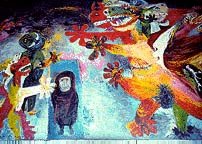 |
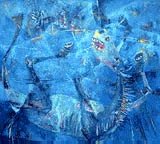 |
| "Grandmother"
(Oil on canvas, 180 x 200, 1970s). "My grandmother's house
was destroyed by Soviet power." Rasim Babayev. |
"Blue
Horse" (Oil on canvas, 120 x 160, 1994) "This is the
contemporary period we are living in. It's a horse but its' me,
too. We're in a difficult stage." |
Rasim Babayev can be reached
in Baku at (994-12) 38-22-87.
From
Azerbaijan
International
(3.1) Spring 1995.
© Azerbaijan International 1995. All rights reserved.
Back to Index
AI 3.1 (Spring 1995)
AI Home |
Magazine
Choice
| Topics
| Store
| Contact
us
|







